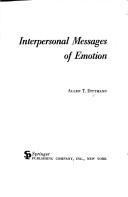| Listing 1 - 4 of 4 |
Sort by
|
Book
ISBN: 0120530503 1322459703 1483265889 9780120530502 Year: 1972 Publisher: New York (N.Y.): Academic press,
Abstract | Keywords | Export | Availability | Bookmark
 Loading...
Loading...Choose an application
- Reference Manager
- EndNote
- RefWorks (Direct export to RefWorks)
Communication and Affect
Affect (Psychology) --- Communication --- Congresses --- Psychological aspects --- 316.77 --- -Communication --- -Communication, Primitive --- Mass communication --- Sociology --- Emotions --- Psychology --- Communicatiesociologie --- -Congresses --- Congresses. --- -Communicatiesociologie --- 316.77 Communicatiesociologie --- -316.77 Communicatiesociologie --- Communication, Primitive --- Psychological aspects&delete& --- Affect (Psychology) - Congresses --- Communication - Psychological aspects - Congresses

ISBN: 0826113400 Year: 1972 Publisher: New York, N.Y. Springer
Abstract | Keywords | Export | Availability | Bookmark
 Loading...
Loading...Choose an application
- Reference Manager
- EndNote
- RefWorks (Direct export to RefWorks)
Social psychology --- Affective and dynamic functions --- Semiotics --- Interpersonal communication --- Emotions --- 159.923.33*1 --- Communication --- Interpersonal relations --- Feelings --- Human emotions --- Passions --- Psychology --- Affect (Psychology) --- Affective neuroscience --- Apathy --- Pathognomy --- Communicatie. Relatie --- 159.923.33*1 Communicatie. Relatie
Book
ISBN: 0080166431 132230047X 1483147630 9780080166438 Year: 1972 Volume: 11 Publisher: New York (N.Y.): Pergamon,
Abstract | Keywords | Export | Availability | Bookmark
 Loading...
Loading...Choose an application
- Reference Manager
- EndNote
- RefWorks (Direct export to RefWorks)
Affective and dynamic functions --- Semiotics --- Emotions --- Facial expression --- Expression du visage --- Facial Expression --- Emotions. --- Facial Expression. --- Face --- Facial expressions --- Body language --- Expression --- Feelings --- Human emotions --- Passions --- Psychology --- Affect (Psychology) --- Affective neuroscience --- Apathy --- Pathognomy --- Expression, Facial --- Expressions, Facial --- Facial Expressions --- Physiognomy --- Regret --- Emotion --- Feeling --- Regrets --- Face Expression --- Expression, Face --- Face Expressions
Book
ISBN: 0521084504 0521114772 0511735812 Year: 1972 Publisher: Cambridge
Abstract | Keywords | Export | Availability | Bookmark
 Loading...
Loading...Choose an application
- Reference Manager
- EndNote
- RefWorks (Direct export to RefWorks)
A study in the philosophy of mind, centred on the problem of 'intentionality' the sense in which emotions can be said to have objects, their relation to these objects, and the implications of this relation for our understanding of human action and behaviour. Dr Wilson sets his enquiry against a broad historical background on what distinguishes man from inanimate objects by describing both Cartesian view of man is matter plus mind and the neo-Wittgensteinian view that there is a dynamic behavioural difference - causal notions being often inapplicable to human action. Dr Wilson goes on to show the controversies and arguments that arise from the notion of intentionality cannot be analysed in causal terms. Dr Wilson believes that this notion can be shown causally and sets out to prove it. Finally, he brings this argument to a larger context mentioning that it has far-reaching effects in natural and social sciences.
Affective and dynamic functions --- Human beings --- Mind and body --- Intentionalism --- Emotions --- Homme --- Esprit et corps --- Intentionnalité (Psychologie) --- Intentionnalité (Psychologie) --- Arts and Humanities --- Philosophy --- Human beings. --- Mind and body. --- Intentionalism. --- Emotions. --- Act psychology --- Action psychology --- Psychology --- Body and mind --- Body and soul (Philosophy) --- Human body --- Mind --- Mind-body connection --- Mind-body relations --- Mind-cure --- Somatopsychics --- Brain --- Dualism --- Philosophical anthropology --- Holistic medicine --- Mental healing --- Parousia (Philosophy) --- Phrenology --- Psychophysiology --- Self --- Homo sapiens --- Human race --- Humanity (Human beings) --- Humankind --- Humans --- Man --- Mankind --- People --- Hominids --- Persons --- Feelings --- Human emotions --- Passions --- Affect (Psychology) --- Affective neuroscience --- Apathy --- Pathognomy --- Psychological aspects
| Listing 1 - 4 of 4 |
Sort by
|

 Search
Search Feedback
Feedback About UniCat
About UniCat  Help
Help News
News